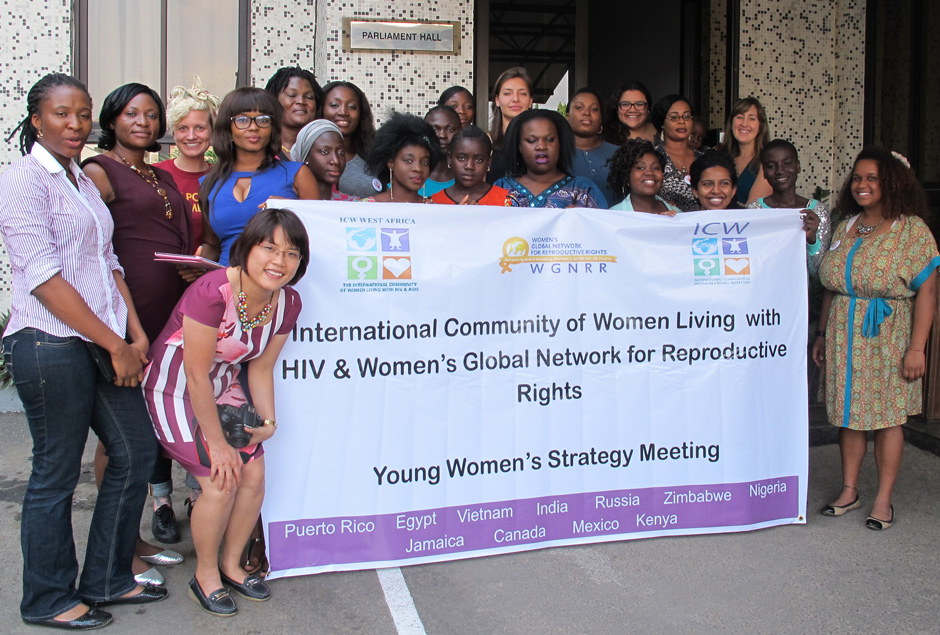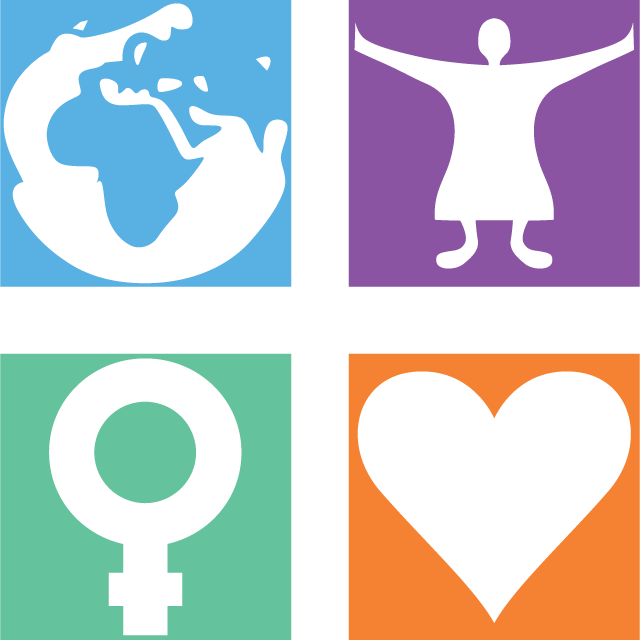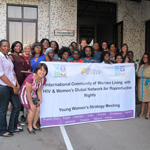Press Releases
The Release of Walking in Our Shoes
Released date: 09-Mar-2018

Mother and Child photo courtesy of UNAIDS
A new report ‘Walking in our shoes; Perspectives of pregnant and breastfeeding women living with HIV on access to and retention in care in Malawi, Uganda and Zambia’
released today in honour of International Women’s Day, highlights the key factors that facilitate retention in care for women living with HIV and calls
for increased focus on rights and dignity in care. The report, presents the findings of community-led research related to the viewpoints and experiences
of women who were initiated on antiretroviral treatment during pregnancy or breastfeeding and explores their perspectives on factors that have enabled
them to successfully adhere to their treatment and retain in care.
The research for this report was coordinated jointly by the Global Network of People living with HIV (GNP+) and the International Community of Women living with HIV (ICW) in partnership with
ICW Eastern Africa and ICW Malawi and the Network of Zambian People living with HIV/AIDS
(NZP+). This research, carried out by and for women living with HIV was conducted in three countries, Malawi, Uganda and Zambia, all of which are early
implementers of the lifelong ARV treatment program (Option B+). Focus group discussions were held with women living with HIV who utilized services
along with key informant interviews with healthcare workers, government representatives, international NGOs and community groups.
The aim of this research project is to develop a set of best practices on how healthcare systems can retain women living with HIV into lifelong care now
that pregnant women living with HIV are being offered lifelong treatment. The report outlines from their own perspectives what factors help women living
with HIV adhere to lifelong treatment and care.
Rebecca Matheson, ICW Global Director explains “Over time the perspectives and experiences of women living with HIV have been instrumental in shaping policy and programs to ensure they respond to our needs. This research and the report provides evidence from women’s voices on what has been supporting and enabling facilitators for adhering to treatment and retaining in care. We applaud the women for sharing our collective experience because the insights from this report will contribute to the achievement of global HIV targets.”
Critically, the women living with HIV who were interviewed called for increased respect for their rights and dignity and said initiatives to address stigma
and discrimination helped them retain in care:
“The health workers are very friendly and they don’t discriminate against us.” Woman living with HIV, Lambulira, Malawi
“It is confidentiality. When these people have confidence in you that can maintain them in care.” Healthcare worker, Entebbe, Uganda
“What motivates me to come for medication is that the doctors do not treat us badly. They do not bark at us and order us around saying, “I told you to go there”. The doctor handles you very well. He or she cares to look for your file if it gets lost so that you leave this place with medication.” Woman living with HIV, Entebbe, Uganda
The women interviewed also highlighted the importance of quality woman-centred services:
“We only have a single day when you can collect treatment. So we all come on the same day. We all make one big queue. Sometimes we see some women who keep going around without joining they queue because they are ashamed. We should have a system where you can come to collect drugs any day so that you can come to the centre at the time that is most convenient to you.” Woman living with HIV, Katete, Zambia
“The fact that the hospital combined baby clinics with ART appointments motivates me to stay on treatment because I have time to do other personal things” Woman living with HIV, Chitipa, Malawi
Another key facilitator identified in the report is the ongoing need for sustained practical and emotional support to empower women living with HIV:
“At the support group, we share with each other the challenges that we are facing while taking the ARVs and encourage one another on how we can overcome them.” Woman living with HIV, Makata, Malawi
“It’s the Community Volunteer, she really encourages me. Sometimes I am discouraged and want to stop medication but she encourages me.” Woman living with HIV, Chimtende, Zambia
“Women should get good counselling and encouragement. They should be told how they will feel when they start taking treatment …. They should be told the benefits, this is not the same for everyone; sometimes you can be sickly if you do not take medication however, with medication that can stop.”
Woman living with HIV, Chimtende, Zambia
“We are already using the findings of this research very practically to work in collaboration with our Ministry of Health to build on Malawi’s programmatic successes and guide our work together to improve the quality of services and increase retention of women living with HIV in prevention of vertical transmission programming”, said Clara Banya, ICW Malawi, Research Team Member and Advocate
Laurel Sprague from GNP+ said: “Now that countries are offering lifelong treatment for women living with HIV it is critical that we support women to remain in care to monitor and maintain their own health and to prevent vertical transmission. Our research showed that women have a strong sense of the factors that can support them on their path of lifelong treatment. We must make sure we listen and adapt healthcare systems to better support women and their families.”
Global Network of People Living with HIV (GNP+) works to improve the quality of life of all people living with HIV. This means we
advocate for, and support fair and equal access to treatment, care and support services for people living with HIV around the world.
The International Community of Women Living with HIV (ICW) is the only grassroots global network run by and for women living with HIV.
ICW is the voice and representation of women living with HIV, in all our diversity. We currently work in 120 countries and through 10 regional networks:
Asia Pacific, Caribbean, Central Africa, Eastern Africa, Europe and Central Asia, Latin America, the Middle East and North Africa (MENA), North America,
Southern Africa, West Africa, the Chapter of Young Women and Girls (CYWAG) and our newly launched Indigenous Network of Women Living with HIV.
For More Information:
Florence Anam, Global Advocacy and Communications Manager
Coco Jervis, Senior Communications and Advocacy Officer
Introducing The ICW Young Women Media Team
Released date: 17-May-2016
Nairobi, Kenya.
A beautiful storm is brewing and all roads are leading to Durban for the AIDS 2016. Young women living with HIV would not be left behind and are a tornado forming. Young women living with HIV have a powerful and valued voice in the community. We promise that the team selected after a rigorous search from the long list of applicants for the CYWAG AIDS 2016 Media Team will blow your minds away.
It will ensure whether you are at the AIDS Conference in Durban, South Africa July 18th–22nd in person or not you will be fully represented and no one will be left behind. This can be seen in the diversity of the team and their experiences. Together our ages are from 17–29 and we come from India, Wales, Kenya, Rwanda, Australia, Puerto Rico, Barbados and the United States.
“Being part of the team is the best thing ever, I am so excited and cannot wait to share my thoughts and experience with the world throughout this journey. It’s a dream come true,” Lucy Wanjiku from Kenya had this to say after being selected successful applicant.
The CYWAG Media Team seeks to ensure that all young women, adolescent and girls living with HIV around the world are represented. Their needs and issues as if they were there in person. Change begins when steps are taken that involve everyone. The team will be blogging, tweeting, ‘Facebookking’, writing media releases and gathering as much information as possible. The process which has already started will climax at the AIDS 2016 Conference in Durban. Let’s get geared together as we prepare for this amazing journey.
Women united cannot be defeated, young women working for others is the true spirit of a sisters keeper for AIDS 2016.
For more information:
Jessica Whitbread
Community Mobilization Manager
International Community of Women Living with HIV
[email protected]
Womens’s Networking Zone unveils Roadmap to Durban 2016
Released date: 22-Jul-2015
Vancouver, Canada: 21st July, 2015 – Today the Women’s Networking Zone (WNZ), coordinated by the International Community of Women living
with HIV (ICW), in partnership with International Community of Women Living with HIV Southern Africa (ICWSA) and ATHENA Network, at the Gallery Gachet
in Vancouver, launched the road map to a series of activities planned for the 21st International AIDS Conference (IAC) to take place in Durban from 17
to 22 July 2016.
In a ceremonious handover, the women of the Asia Pacific region handed over the torch to the women of Southern Africa region who will take the lead in
organizing the AIDS 2016 WNZ in Durban.
The WNZ is a community-focused forum running parallel to the International AIDS Conference with a full program of workshops, critical dialogues, strategy
sessions and performance arts.
Building on a long history beginning in Durban in 2000, the WNZ strives to continue to be the heart of women’s rights organizing and movement building
leading up to 2016 and beyond.
The theme of the launch event was Building Bridges as we strive for a strong, unified feminist HIV movement for all self identifying women.
“Today, more than 30 years into the epidemic, women and girls account for over 16 million people living with HIV worldwide (over 50%). In sub-Saharan Africa,
young women aged 15 to 24 are more than three times likely to be infected as young men in the same age group. As women and girls of Africa, we are
more than excited and highly motivated to be in the lead and driving the agenda at the WNZ at AIDS2016, with the welcome support of our sisters and
supporters all over the world. The WNZ resonates to the principle of ‘Nothing for us Without Us’. Women and girls, in all their diversities, need to
be at the center of platforms shaping the agenda, policy and programming of the HIV and Reproductive Health initiatives. This opportunity gives women
and girls of Africa the room to reclaim their spaces and share their experiences and expertise,” said Martha Tholanah, ICWSA Chair.
The WNZ is the heart of women’s rights organizing and movement building at AIDS 2016 and beyond. The objective is to elevate awareness at the global, regional
and national levels – highlighting the disproportionate impact HIV and AIDS has on women and girls. The focus on Africa will provide advocacy skills
and opportunities for women and girls, and set in motion greater engagement of those most affected. We are committed to leaving no one behind as we
embark on the journey towards developing country and regional implementation plans for unfinished work for the Millennium Development Goals and set
the pace for women and girls to actively engage in achievement of desires in the Sustainable Development Goals (SDGs).

More than Our Status! Our Bodies! Our Sexual & Reproductive Health and Rights!
Released date: 04-May-2015
May 1, 2015
Abuja, Nigeria

United, 22 young women HIV and Sexual and Reproductive Health and Rights activists came together for the Young Women’s Strategy Meeting in Abuja, Nigeria,
April 28–29, 2015. During this strategic session the women from Nigeria, India, Kenya, Zimbabwe, Russia, Jamaica, Canada, Mexico, Puerto Rico (US)
and Vietnam spent time strategizing how to strengthen a joint response to address the stigma for women living with HIV in accessing sexual and reproductive
health services. Together they decided to form a global campaign under the slogan More than Our Status! Our Bodies! Our Sexual & Reproductive Health and Rights! with the hashtag #DoYouSeeHIV.
“We need to work together for each other! We will be stronger and there is so much that we can learn. Jointly we cannot stand for any young woman to not
have access to quality sexual and reproductive health services, including women living with HIV,” said Ugochi Egwuatu from the Generation Initiative
for Women and Youth, Nigeria [who is going to say this] “We were horrified listening to the cases of health care violations such as forced and coerced
sterilization of women living with HIV.” said Dinh Nga representing the Center for Creative Initiatives in Health an Population in Vietnam.
The Young Women’s Strategy Meeting is part of a 1–year funded project by the International Community of Women Living with HIV (ICW) and the Women’s Global
Network on Reproductive Rights (WGNRR). The regional ICW West Africa team has been taking the lead to develop a regional coalition that recently participated
in an advocacy training and undertook a comprehensive peer driven research project to document health care violations experienced by women living with
HIV in Nigeria. From now until World AIDS Day, December 1, 2015, the project will support the amazing work that the networks of women activists are
doing in Nigeria and around the world.
“As a young woman living with HIV, it was so nice to be in the room. I felt empowered and like we could take on the world,” said L’Orangelis Thomas ICW’s
Chapter for Young Women, Adolescents and Girls member from Puerto Rico (US).
If you’d like to find out more about the collaboration and what advocacy activities the coalition will be leading, please contact:
Jessica Whitbread ([email protected])
ICW Community Relations and Mobilization Manager
See also
-
News
What we are up to and news that matters to women living with HIV.
-
Current Campaigns
Campaigns that we are running.
Author
Table of Contents
Toggle
